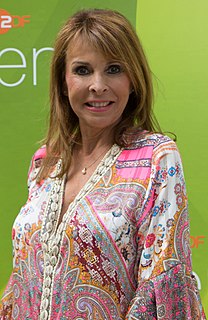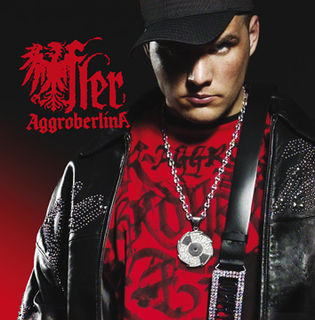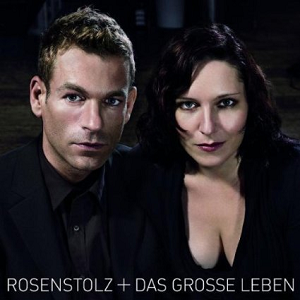
Udo Jürgens was an Austrian composer and singer of popular music whose career spanned over 50 years. He won the Eurovision Song Contest 1966 for Austria, composed close to 1,000 songs, and sold over 100 million records. In 2007, he additionally obtained Swiss citizenship.

Tocotronic is a German rock band founded in 1993. Similar to Blumfeld or Die Sterne they are considered a part of the Hamburger Schule movement. They are influential for bands such as Wir sind Helden.
German modal particles are uninflected words that are used mainly in the spontaneous spoken language in colloquial registers in German. Their dual function is to reflect the mood or the attitude of the speaker or the narrator and to highlight the sentence's focus.

Gestern war heute noch morgen is a song compilation of the German rock band Böhse Onkelz. It was released on three CDs. The box reached the third position in the German Media Control Charts which is really rare for best-ofs.

Michael Holm is a German singer, musician, songwriter and record producer. He is primarily known as a singer of Schlager music. Although his first appearance in the hit parade was in 1962, he had his first big hit in 1969. "Mendocino", the German adaptation of a song by the Sir Douglas Quintet, was the biggest selling single that year in (Germany). The record was released in September 1969, reached number three for five weeks, selling over a million copies. Ariola presented him with a gold record in October 1970.

Ireen Sheer is a German-English singer. She had a top five hit on the German singles chart with "Goodbye Mama" in 1973. She went on to finish fourth at the Eurovision Song Contest 1974 representing Luxembourg, sixth at the Eurovision Song Contest 1978 representing Germany, and thirteenth at the Eurovision Song Contest 1985 representing Luxembourg again.

Lena Valaitis is a Lithuanian–German schlager singer who had her greatest success during the 1970s and 1980s. She finished second at the 1981 Eurovision Song Contest.

Katja Ebstein is a German singer. She was born in Girlachsdorf. She achieved success with songs such as "Theater" and "Es war einmal ein Jäger". She was married to Christian Bruhn, who wrote many of her songs.
Fertig, Los! was an indie rock band from Germany. It was formed in the summer of 2004 in Munich. Its members consisted of Julia Viechtl (bassist), Florian Wille (drummer), and Philipp Leu. The band split up in 2013.

German rapper Fler has released 17 studio albums, four mixtapes, one EP, six collaborative albums and 59 singles.

Geier Sturzflug was a German musical group of the Neue Deutsche Welle genre, created in 1979, and probably best known for their hits "Bruttosozialprodukt", "Pure Lust am Leben," "Einsamkeit," and "Besuchen Sie Europa." The first of these was number one in Germany for the entire month of May 1983. Stylistically they combine music styles of rock, pop, ska, and jazz with cynical lyrics. Their name translates to "Vulture Nosedive" in English.

Michael Schanze is a German television presenter, actor and singer.

Doris Inge Wegener, better known by her stage name Manuela, was a German singer.

Frei.Wild is a German rock band from Brixen, South Tyrol, Italy. Its members belong to the German-speaking population of South Tyrol and their songs are mostly in German.

Das große Leben is the tenth studio album by German pop duo Rosenstolz, released in 2006 by Island Records. Consisting mostly of ballads, the album topped the German and Austrian albums charts and became Rosenstolz's biggest selling album, with over one million copies sold. Five singles from the album were top 20 hits in Germany.

Franz Schubert's best known song cycles, like Die schöne Müllerin and Winterreise are based on separate poems with a common theme and narrative. Other song cycles are based on consecutive excerpts of the same literary work: Schubert's "Ave Maria" is part of such a song cycle based on excerpts of the same poem, in this case by Walter Scott.
"Herzlich tut mich verlangen" is a German hymn, with lyrics written in 1599 by Christoph Knoll, with a melody adapted from a secular song by Hans Leo Hassler. It is a prayer for a blessed death, beginning "Herzlich tut mich verlangen nach einem sel'gen End". Its hymn tune, Zahn No. 5385a, was later also used for Paul Gerhardt's "Befiehl du deine Wege" and "O Haupt voll Blut und Wunden".

Jonny Hill is an Austrian singer. He is best known for the songs “Ruf Teddybär eins vier”, “Der alte Mann” and “30 Tonnen Kerosin”.

Gerd Günther Grabowski, better known by his stage name G. G. Anderson, is a German Schlager singer, composer, and music producer.
















